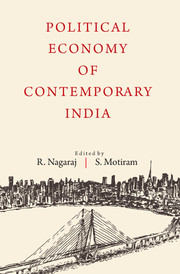Book contents
- Frontmatter
- Contents
- List of Tables and Maps
- List of Figures and Pictures
- Preface
- 1 Introduction: From ‘Intermediate Regime’ to Crony Capitalism
- Economy-wide Considerations
- Political Economy by Regions of India
- Urban Labour Markets
- Land and Rural Labour
- 9 Peripheral Agriculture? Macro and Micro Dynamics of Land Sales and Land Use Changes in the ‘Rural’ Economy of Kancheepuram
- 10 Infrastructures of Growth, Corridors of Power: The Making of the SEZ Act 2005
- 11 Land-based Financing for Infrastructure: What is New about India's Land Conflicts?
- 12 Political Economy of Land Acquisition and Resource Development in India
- 13 Advice and Dissent: The Federal Politics of Reforming India's Land Acquisition Legislation
- 14 ‘Workers’ or ‘Beneficiaries’: The Varied Politics of NREGA Implementation in South-West Madhya Pradesh
- About the Contributors
- Index
12 - Political Economy of Land Acquisition and Resource Development in India
from Land and Rural Labour
Published online by Cambridge University Press: 08 February 2018
- Frontmatter
- Contents
- List of Tables and Maps
- List of Figures and Pictures
- Preface
- 1 Introduction: From ‘Intermediate Regime’ to Crony Capitalism
- Economy-wide Considerations
- Political Economy by Regions of India
- Urban Labour Markets
- Land and Rural Labour
- 9 Peripheral Agriculture? Macro and Micro Dynamics of Land Sales and Land Use Changes in the ‘Rural’ Economy of Kancheepuram
- 10 Infrastructures of Growth, Corridors of Power: The Making of the SEZ Act 2005
- 11 Land-based Financing for Infrastructure: What is New about India's Land Conflicts?
- 12 Political Economy of Land Acquisition and Resource Development in India
- 13 Advice and Dissent: The Federal Politics of Reforming India's Land Acquisition Legislation
- 14 ‘Workers’ or ‘Beneficiaries’: The Varied Politics of NREGA Implementation in South-West Madhya Pradesh
- About the Contributors
- Index
Summary
Land Acquisition: The Contested Domain
Land is a non-expandable factor of production. This very finiteness tends to cause competition for this scarce resource between various economic activities. In capitalist societies, the industrial and service sectors, dominated by the bourgeoisie and supported by the state's right of eminent domain, adopt land usurpation and acquisition by hyper commercialisation and commodification of land. The land acquisition process in India has come under close scrutiny within the overall context of economic growth and transformation from an agrarian economy to an industrial economy. Land acquisition with regard to resource based project becomes more complex as these resources are geographically located and projects becomes region specific.
The traditional argument as posited by the Lewis Model states that economic growth requires structural change in the economy whereby surplus labour in traditional agricultural sector with low or zero marginal product, migrate to the modern industrial sector with high rising marginal product. This promotes industrialization. The Lewis model necessitates structural change and thus explains the emergence of a dual economy. Land becomes a pre-requisite for industrialization. It implies that land has to change character from its present use to industrial use. The debate about industrialization and land acquisition is thus about how political, social and economic forces are acting in concert to transform the economy. At a more basic level, this problem occurs because the emerging industrial sector usually does not have the level of employment intensity as the existing agricultural activity. Moreover, affected people are not immediately employable as the only marketable commodity they possess in the absence of skills valued by the market, is their labour. This alienates the peasantry from their traditional means of livelihood and more often than not results in social turmoil and unrest.
Many developing countries, including India, have been undergoing this process of transformation over recent decades raising several questions about the true nature of the welfare state and its role in protecting the right to property. In India, the role of the state seems to have got reversed; after independence, through land reform, the government attempted to create a socialistic pattern of society through redistribution of land, which is now being reversed through increased acquisition of land from small and medium owners for industrialisation.
- Type
- Chapter
- Information
- Political Economy of Contemporary India , pp. 279 - 306Publisher: Cambridge University PressPrint publication year: 2016



